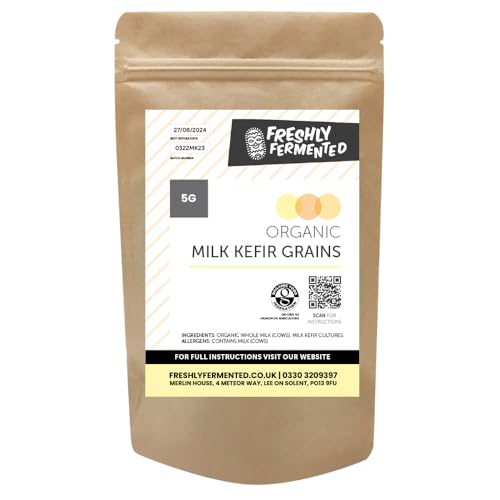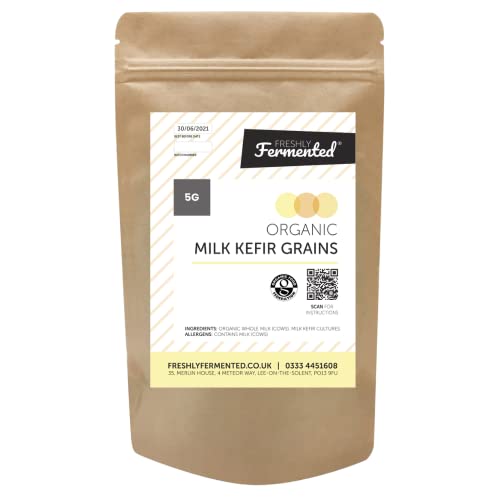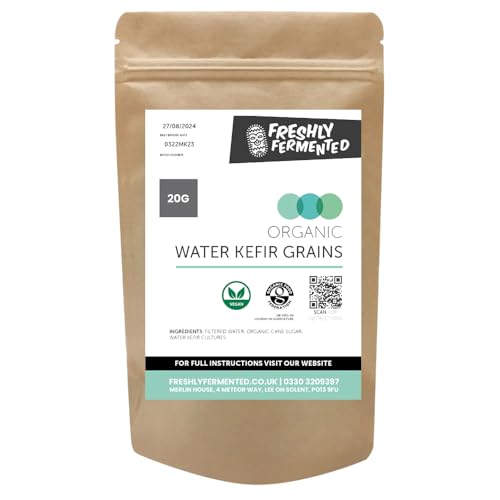What is a Kefir Starter and Why Do We Need One?
Understanding Kefir Starters
A kefir starter is a collection of specific bacteria and yeast that are essential for fermenting milk or water to produce kefir, a probiotic-rich drink known for its health benefits. By introducing these unique microorganisms into your base ingredient, whether it’s milk or water, you create an environment where fermentation can occur. The fermentation process transforms lactose into lactic acid, thickening the liquid and giving it a tangy flavour. We require a kefir starter because it’s the catalyst that initiates this transformation, ensuring that we produce a nutritious beverage packed with probiotics.
Why We Need Kefir Starters
Using a kefir starter is crucial for a successful fermentation. Without it, our efforts to create kefir could result in a beverage that is not only unsavoury but also lacks the beneficial bacteria we seek. A good starter introduces a balanced culture of friendly microorganisms that work together to ensure the fermentation is both effective and beneficial. Moreover, each starter can vary in its composition, leading to different flavour profiles and health benefits, which adds an exciting dimension to homemade kefir.
Choosing the Right Kefir Starter for Your Needs
Types of Kefir Starters
There are two main types of kefir starters available: milk kefir starters and water kefir starters. If you’re looking to make dairy kefir, you’ll need a milk starter, usually in the form of kefir grains or powdered culture, that thrives well in milk. For those who prefer non-dairy options, a water kefir starter is what you need, which can be used with sugar water, coconut water, or juices. When selecting a starter, consider your dietary preferences and the kind of kefir you wish to produce.
Assessing Your Personal Preferences
Think about flavour, texture, and health benefits when choosing your kefir starter. For example, some starters may produce a creamier kefir, while others lead to a more drinkable consistency. Additionally, if you are keen on specific probiotic strains for health reasons, read the labels carefully as certain starters may contain higher amounts of particular bacteria that can support gut health or immune function.
How to Use Your Kefir Starter Effectively
Preparation Steps for Successful Fermentation
To use your kefir starter effectively, start with clean, sterilised jars to ensure that no unwanted bacteria interferes with the fermentation process. If you are using grains, simply add them to your choice of milk or water along with a little sugar if needed, and cover the jar with a cloth to allow airflow while keeping contaminants out. If you’re using a powdered starter, follow the instructions on the packaging, as each one may have specific requirements for temperature and fermentation time.
Monitoring the Fermentation Process
Keep an eye on your kefir as it ferments. Temperature plays a significant role; ideally, a warm room (around 20-24 degrees Celsius) is best for fermentation. Depending on the type of starter and your personal taste preferences, fermentation can take anywhere from 12 to 48 hours. Taste it periodically; you’ll know it’s ready when it has that characteristic tang and creamy texture you desire. Remember, longer fermentation results in tangier kefir, so find the right timing that fits your palate.
Top Tips for Storing and Maintaining Your Kefir Starter
Proper Storage Techniques
If you’re not planning to use your kefir starter immediately, proper storage is essential to maintain its potency. For grains, simply rinse them off and store them in a small jar with a little milk, placing them in the fridge where they’ll go dormant. Powdered starters should be stored in a cool, dry place, usually in the original packaging, and kept away from heat to extend their shelf life.
Reactivating Your Starter
Should your grains go dormant, or if you’re reusing a dried starter, you can reactivate them by placing them in fresh milk or sugar water at room temperature for a day or two. This helps to wake them up and get them ready for the fermentation process. Always remember to keep the container clean, and avoid metal utensils, as they can harm the bacteria.
Frequently Asked Questions About Kefir Starters
Common Queries and Concerns
Many newcomers to kefir-making often have questions about the process. One common concern is whether the starter will expire. Typically, a powdered starter has a shelf life printed on the packaging, while kefir grains can last indefinitely if maintained properly. A question that arises often is whether one can mix different types of starters; it’s generally best to stick with one type as they have different fermentation needs and could inhibit each other’s performance if combined.
Troubleshooting Your Kefir
For those who encounter problems, such as separation or off-flavours, it helps to ensure you’re using quality ingredients and to check the temperature of your fermentation environment. If your kefir isn’t thickening, it might need more time or a slight increase in temperature. Most issues can be resolved by adjusting these factors or giving your kefir more attention, ensuring that you produce the best homebrew possible.
























